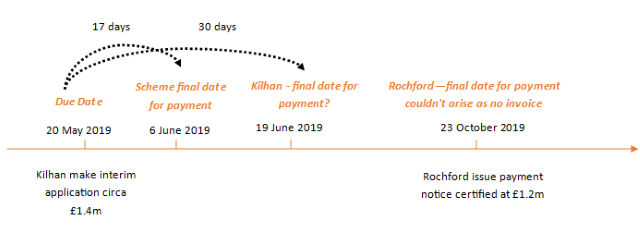Do your payment terms need to be revisited?

Article
06 October, 2020
Do you know what the payment provisions are within your contract?
How do you ensure that you comply with the timeframes?
Are your payment terms compliant with the Scheme for Construction Contracts?
A recent Technology and Construction Court decision in the matter of Rochford Construction Limited v Kilhan Construction Limited [2020] EWHC 941 has left us with two vital takeaways:
- there needs to be certainty in your payment mechanisms; and
- linking the final date for payment to the issuing of a VAT invoice will fall foul of the Construction Act (and will therefore be invalid).
You need to evaluate your existing contracts to see what impact this may have on the timeframes that you are working to.
Case overview
Kilhan was engaged by Rochford as the subcontractor to provide a reinforced concrete frame at a project for Richmond upon Thames College.
A timeline of important events and the respective party's positions are outlined below:

A dispute arose as to the validity of a payment notice issued by Rochford some five months after an interim application by Kilhan. Rochford refused to pay the £1.4m specified in the application. Kilhan referred the dispute to adjudication on the basis that Rochford's payment notice was not valid.
The adjudicator was asked to determine whether that payment notice was in fact valid. Kilhan was successful in its referral to the Adjudicator and Rochford was ordered to pay £1.4m.
However…
Rochford refused to pay in accordance with the Adjudicator's decision and Kilhan commenced enforcement proceedings in the TCC. Rochford separately commenced Part 8 proceedings seeking a declaration that:
"Under the express terms of the Subcontract, the Final Date for Payment of any sum that has become due in 30 days from the date of service of a relevant invoice."
The Court considered the terms of the Subcontract, with particular emphasis on the final payment date being "30 days from the date of service of a relevant invoice".
Section 110(1) of the Housing Grants, Construction and Regeneration Act 1996 (as amended) ("the Construction Act") provides that:
"Every construction contract shall-
(a) provide an adequate mechanism for determining what payments become due under the contract, and when, and
(b) provide for a final date for payment in relation to any sum which becomes due.
The parties are free to agree how long the period is to be between the date on which a sum becomes due and the final date for payment."
It was emphasised that there is a need for certainty in the payment mechanism and it was unclear when the invoice itself was to be issued.
Of particular interest is the comment made by the judge that:
"while a due date can be fixed by reference to, say, an invoice or a notice, the final date has to be pegged to the due date, and be a set period of time, and not an event or a mechanism."
As the final date for payment in the Subcontract was pegged to the sending of an invoice, and not a specified period of time, this was not consistent with the terms of the Construction Act.
If a construction contract does not include the necessary payment provisions, the relevant provisions of the Scheme for Construction Contracts (England and Wales) Regulations 1998 (SI 1998/649) ("the Scheme") are implied in place of any payment provisions set out in the contract. In that case, the final date for the paying party to make a payment would be 17 days from the due date for payment (paragraph 8(2)).
The indication from this judgment is that attempts in a construction contract to link final dates for payment to VAT invoices (or similar uncertain events) fall foul of the Construction Act, which does not permit "floating" final dates for payment. The implication is therefore that the Scheme would apply and the timescales for payment that you might believe to be applicable to your contract will not be.
The Court's decision on this point was obiter and so it may be open to challenge in the TCC, however it is important to consider your existing payment provisions to determine whether they are compliant with the Construction Act and if not:
- ensure that for existing projects pay-less notices are submitted within 17 days from the due date; and
- amend the wording of your payment provisions for future contracts.
For more information contact Lucy Bailey in our Construction & Infrastructure department via email or phone on 0333 207 0677. Alternatively send any question through to Forbes Solicitors via our online Contact Form.
Learn more about our Construction & Infrastructure department here
Contact Us
Get in touch to see how our experts could help you.
Contacting Us
Monday to Friday:
09:00 to 17:00
Saturday and Sunday:
Closed
